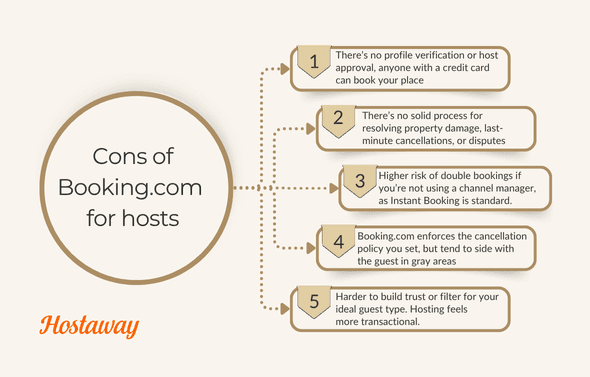Booking.com Pros and Cons

Booking.com looks like a no-brainer. Huge visibility, international reach and instant bookings? That’s hard to ignore, especially if you’re managing multiple properties or trying to fill gaps in your calendar fast.
But here’s the catch: scale and convenience come at a cost.
There’s no real guest vetting. Commission fees can eat into your profit. And unless your calendar sync is airtight, double bookings are always lurking.
This guide strips away the marketing gloss. We’re diving into the real pros and cons of Booking.com from a host’s point of view, what works, what doesn’t and how to make it play nicely with your broader strategy. Whether you’re just testing the waters or fine-tuning a multi-channel strategy, you’ll walk away knowing if this platform deserves a seat at your table.

How Does Booking.com Work for Hosts and Guests
Booking.com is one of the world’s most visited travel websites and for good reason. This global booking site offers everything from hotel rooms and vacation rentals to apartments and unique stays. For guests, it’s a go-to platform to compare prices, read guest reviews and score the best deal on accommodations worldwide.
But it’s not just about the guest experience.
Many property owners and property managers turn to Booking.com to boost their occupancy rates and reach a broader customer base. Thanks to its global reach, extensive marketing and high traffic volume, hosts who list on Booking.com often see more bookings, especially from travelers looking for instant book options.
The booking site’s user-friendly website makes it easy to manage listings, while its promotional engine helps surface properties to the right audience at the right time. It’s a powerful tool for growing your short-term rental business if you know how to use it to your advantage.

Why Hosts Choose Booking.com
According to Emily Tusick, account manager, partner services at Booking.com "We advertise your listings on major search engines like Google, Bing, Yahoo, in over 45 different languages."
For property owners and managers, Booking.com offers access to a massive customer base, including tourists and everyday guests searching for the best deal. Listing on the platform can lead to more bookings, improved occupancy rates and exposure you might not get through direct bookings alone.
With features like the user-friendly website and strong marketing muscle, Booking.com helps your properties get seen by the right audience at the right time. And thanks to competitive service fees (relative to other platforms), many hosts find the trade-off between cost and visibility worth it.
What guests like about Booking.com
On the guest side, Booking.com is a top booking site for a reason. The platform offers a wide range of accommodations, from hotel rooms to vacation rentals and apartments. Guests can compare prices, sort by filters and book confidently with clear cancellation policies.

What Hosting on Booking.com Looks Like
For property owners and property managers, Booking.com can be a powerful way to drive more bookings and increase revenue, especially when combined with a solid direct bookings strategy.
The platform’s commission fees are generally lower than some other platforms, making it a relatively cost-effective option for expanding your reach.
Thanks to its global reach and strong brand reputation, Booking.com connects your listings with a wide customer base, including international travelers and business travelers who trust the platform to deliver reliable accommodations.
https://youtu.be/wi8abTYGS8o?si=kABEhGLUrAWQTn0e
Tools for Hosts That Save Time and Effort
Booking.com doesn’t just stop at exposure. It also offers practical tools for day-to-day hosting. Apart from the extranet, the Pulse app lets you manage your properties, track performance and respond to messages right from your phone.
Tool | What it does |
Pulse app | Manage bookings, calendar and guest messages from your phone. |
Instant book | Accept reservations automatically, no host approval needed. |
Smart calendar sync | Prevent double bookings with real-time availability updates. |
Visibility booster | Get your listing featured more prominently in search results. |
Guest messaging tools | Send automated replies or updates on time. |
Performance insights | Track booking trends, occupancy and revenue over time. |
Listing management | Easily update photos, pricing and details across all your properties. |
Invoicing & payouts | Monitor service fees, track payments and download financial records. |
What Your Listing Will Look Like on Booking.com
When you list a property on Booking.com, it’s going to look a little different from Airbnb or Vrbo. The layout is more structured, a bit more “hotel-style,” and geared toward guests who want to scan, compare and book promptly.
Your listing includes the basics: photos, pricing, amenities, location and availability. But Booking.com puts a lot of weight on details like cancellation policies, check-in rules and whether or not you accept credit card payments. There's also a big emphasis on the total price, including service fees, so guests can compare prices across listings easily.
The review section is prominent and Booking.com’s layout doesn’t leave much room for fluff so clarity is key. If you’ve got a great view or upgraded kitchen, show it off in your photos and call it out in your description.
Guests will also see whether your property is available for instant book, if it suits business travelers and how quickly you respond to guest messages.
It��’s clean, practical and designed to convert browsers into bookings. If you’re managing multiple properties or juggling other platforms, using a property management system can help keep everything aligned.

Managing Bookings and Payments on Booking.com
Booking.com makes it relatively easy to manage guest reservations, get paid and stay on top of day-to-day hosting.
How payments work
As a host, you can choose how you want to receive payments. Many property owners go with credit card payouts through Booking.com’s secure system, but other payout methods are available depending on where you’re based. Everything’s tracked clearly in your dashboard, including service fees, so you always know what you’re earning and what’s being deducted.
Setting policies and managing availability
You have full control over cancellation policies, offering free for flexibility or non-refundable options for guaranteed income. You can also adjust availability, minimum stays and booking rules to match your strategy, whether you’re going for volume or longer-term reservations.
When things go wrong
If something’s off, like a no-show, calendar issue or guest complaint, Booking.com does offer customer support. But here’s the thing, many hosts report that the system for resolving issues can be slow, frustrating or unclear. There's no built-in process for handling guest damages and getting help in urgent situations can feel like shouting into the void. That’s why having clear cancellation terms and solid messaging templates is your best defense. It keeps things consistent and avoids back-and-forth when a booking falls through.
That said, if you’re using Booking.com as part of a broader multi-channel strategy, it's worth having a plan (and maybe a backup platform) in place for when things don’t work out with support.

Service Fees and Commission on Booking.com
Booking.com doesn’t charge hosts to list their properties, but it does take a cut once a reservation is confirmed. Understanding how those fees work is key to setting realistic pricing and protecting your margins.
What hosts pay
Property owners and property managers pay a commission fee on every booking, typically between 10% and 25%, depending on the accommodation type and location. This fee is automatically deducted from your payout.
Unlike some other platforms, Booking.com doesn’t let you tack on an extra “host fee” or adjust the percentage, so it’s important to price your vacation rental accordingly to cover costs like service fees, cleaning and platform commission.
What guests pay
On the guest side, Booking.com includes a service fee in the total price shown during checkout. This fee varies, but it’s often smaller and less visible than what guests might see on Airbnb.
The platform positions itself as a place to compare prices and find the best deal, so keeping pricing competitive is baked into the experience. But the trade-off is visibility: your listing may reach far more international guests and business travelers, especially when your rates are aligned with the local market.
Are the fees worth it?
While the fees can feel steep, especially if you're managing high-volume or high-end properties, they’re in line with what most online travel agencies charge. The upside is access to Booking.com’s marketing engine, wide customer base and established reputation with travelers who already trust the platform.
Used alongside your other channels or a solid direct booking site, Booking.com can be a valuable source of steady traffic, as long as your pricing accounts for commission and platform costs.

Cancellation and Refund Policies on Booking.com
Booking.com gives both hosts and guests some flexibility when it comes to cancellations, but the details really matter.
As a host, you decide what type of cancellation policy to use. You also control how far in advance guests can cancel and whether they’ll get a full refund or just a partial one.
It’s important to set these clearly, because once a guest books, Booking.com enforces your policy as written. Below are the different types of cancellation policies Booking.com offers
Booking.com cancellation policies: At a glance
Policy type | What it means | Good for |
Free cancellation | Guests can cancel for a full refund within a specified window (e.g., up to 7 days before check-in). | Boosting visibility and attracting more bookings. |
Non-refundable | Guests pay in full and won’t get a refund if they cancel, regardless of the reason. | Locking in income and reducing cancellations. |
Partially refundable | Guests get a partial refund (e.g., 50%) if they cancel within a certain timeframe. | Balancing flexibility with revenue protection. |
Custom policies | You set your own terms: refund amount, timing and conditions. | Tailoring cancellation rules to your business model. |
Growing Your Customer Base with Booking.com
Booking.com isn’t just about visibility, it��’s about smart exposure. To grow your customer base, focus on what actually moves the needle:
List on multiple platforms (including your own direct site) and sync calendars via channel manager to avoid double bookings.
Use competitive pricing, especially for single-night stays or slower seasons, to show up in more guest searches.
Enable instant book and free cancellation where it makes sense. These filters get you in front of more travelers.
Take advantage of the site’s tools, highlight your amenities, respond to messages quickly and keep your calendar updated.
Booking.com’s global reach and marketing engine can help, but it works best when you actively optimize your listing. Set it and forget it won’t get you far.
Pro tip: Use tools like StayFi to collect guest emails during their stay, then retarget them later with email campaigns to drive direct bookings: no middleman, no extra fees.

The pros of Booking.com for hosts
1. Massive customer base
With millions of guests, Booking.com gives you exposure that’s hard to beat, especially in Europe and Asia where it’s a dominant player.
2. High booking volume potential
If your pricing and listing are dialed in, you can get more bookings here than on other platforms, especially for last-minute bookings and one-night stays.
3. Instant book is standard
All bookings are instant, which makes it fast and convenient for guests and gets rid of the back-and-forth that slows things down on other platforms.
4. Built-in marketing
You get a bump from Booking.com’s global ad spend, email campaigns and visibility on travel sites and search engines. That exposure is baked into the platform at no extra cost.
5. Tools for multi-property management
With features like the Pulse app, group messaging and bulk editing, Booking.com is built to handle multiple properties, especially for professional property managers.

The Cons of Booking.com for Hosts
1. No guest screening
Unlike Airbnb, there’s no profile verification or host approval step. Anyone with a credit card can book your place. That opens the door to no-shows, guest damages or problematic guests.
2. Limited support when things go wrong
This one’s big. Many hosts report poor customer support, especially in urgent situations. There’s no solid process for resolving property damage, last-minute cancellations or disputes.
3. Higher risk of double bookings
If you're not using a channel manager or PMS to sync calendars, you’ll run into double bookings and Booking.com expects you to honor all reservations, even if your place isn’t available.
4. Strict cancellation and refund enforcement
Whatever cancellation policy you set is what Booking.com enforces, but they tend to side with the guest in gray areas. And there's no built-in option for damage deposits or dispute resolution.
5. Less personal connection with guests
Since there’s no messaging before booking and minimal profile info, it’s harder to build trust or filter for your ideal guest type. It feels more transactional.

Free and Paid Tools to Boost Visibility on Booking.com
Beyond just listing your property, Booking.com offers a mix of free and paid tools to help hosts get seen by more travelers and secure more bookings. Some work automatically, others need to be activated manually, but knowing what’s available can help you stand out in a crowded market.
Free tools to improve performance
1. Visibility Booster (limited free option)
This tool increases your property’s exposure in search results during specific windows, like slow periods or cancellations. It’s free to activate, but it often comes with a suggested discount or commission increase to make it work effectively.
2. Automated messaging tools
Automated replies, saved templates and real-time chat help you stay responsive and improve your review scores. Available via the desktop dashboard or the Pulse app.
3. Promotions & Discounts
You can set up limited-time deals (e.g., Early Booker, Last Minute or Mobile Rates) to attract specific types of travelers. These are free to create, but you’re offering a discount to get better placement.
4. Analytics dashboard
Hosts get access to insights about booking trends, cancellation rates, competitor pricing and guest behavior. It’s not as detailed as some PMS tools, but it gives a solid high-level view.
Paid programs for higher visibility
1. Preferred Partner Program (Paid)
This is for high-performing listings. If you qualify, Booking.com promotes your property with a badge and higher search ranking. The catch: you’ll pay a higher commission fee (usually 3% more) for that extra exposure.
2. Visibility Booster (paid option)
You can choose to pay a higher commission on specific dates to rank higher in search results. You control when and how often it runs.
3. Genius Loyalty Program (Free to join, cost absorbed by host)
Becoming a Genius partner connects you to Booking.com’s “Genius” tier guests, frequent users who book often. You offer a 10%+ discount in exchange for better placement and potentially more reservations. While it’s technically free to join, the cost comes out of your pricing.
Is it worth it?
These tools work, but they’re not magic. If your pricing, photos and listing aren’t solid, no amount of visibility will fix that. But if your foundation is strong, these add-ons can help tip the scale, especially in competitive markets.

Common Mistakes to Avoid on Booking.com
Booking.com can drive serious traffic, but if you’re not careful, it can also create chaos behind the scenes.
Double bookings are one of the biggest headaches, especially if you’re listing on multiple sites like Airbnb, Vrbo and Booking.com. The fix? Use a channel manager or vacation rental software to sync your calendars automatically. Don’t rely on manual updates, it’s way too easy to miss something.
Another common misstep? Skipping the fine print. Booking.com’s terms and conditions, especially around cancellation policies, guest refunds and no-shows, are different from platforms like Airbnb. If you’re not clear on how they work, you might end up eating the cost of a stay that never happened.
The platform works best when you treat it like a tool, not a magic solution. Take the time to understand how it works, set it up properly and protect your business from avoidable problems.

Customer Support and Host Protection on Booking.com
Booking.com offers support through phone, email and live chat to help with bookings, cancellations and technical issues. While some hosts find it inconsistent during time-sensitive problems, others appreciate the access to real humans, something not all platforms guarantee.
The platform also provides Host Liability Insurance, offering up to €1,000,000 in coverage for third-party injury or property damage claims. It's a helpful layer of protection, though it doesn’t extend to guest damages inside your rental, so it's still wise to have your own short-term rental insurance in place.
For more guidance, Booking.com runs a well-organized Partner Hub, an online library full of how-to articles, listing tips, policy explanations and updates. It’s a solid resource for hosts looking to optimize performance or get quick answers without waiting on support.
All in all, Booking.com is continuing to improve its host resources, but, like with any platform, setting strong policies, having a good insurance provider and using the right tech tools (like calendar syncing) goes a long way toward protecting your business.

Is Booking.com the Right Fit for Your Business?
Here’s the honest answer: it depends on how you use it.
Booking.com isn’t a magic wand but it is a powerful tool in the hands of a proactive host. With its massive customer base, built-in marketing engine and high booking volume potential, it can drive serious results. But to make it work for you, you need more than just a listing, you need a strategy.
Sync your calendars. Set realistic prices. Understand the policies. Use tools like the Pulse app, messaging automation and visibility boosters to stay competitive. And don’t forget to collect guest data and invest in your direct bookings funnel on the side.
Whether you're managing a single vacation rental or a portfolio of properties, Booking.com can be part of a smart, sustainable growth plan as long as you stay in the driver’s seat.
Ready to find out how Hostaway can transform your business?
